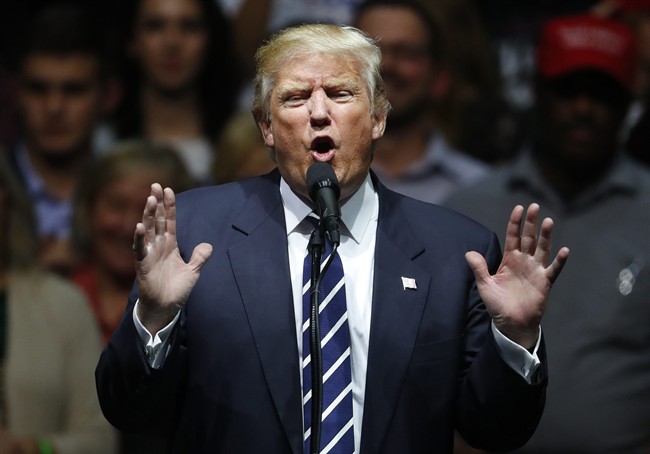We didn’t think Donald Trump would win the election, we don’t think we’re happy and we think that the Muslim population in our country is on the rise.

These are just a few ways that Canadians are out of touch with the world outside their door, according to a new Ipsos poll.
The survey, titled the Perils of Perception, shows that Canada, along with the 39 other countries, has a bleak view of their own situations, when that’s not really the case at all.
READ MORE: How well do you know Canada? Ipsos survey reveals how out of touch Canadians are in 2015
Darrell Bricker, the Global CEO of Ipsos Public Affairs, says it’s surprising that people around the world are so “out of step with what’s really going on.”
But that’s why the survey is important.
“And we’re dealing with some of the myths that really drive politics, public policy… it’s better that we know what the truth is.”
For example, Canadians assume that around 17 per cent of the population is Muslim, according to the report. However, the number is only three per cent.
This is one myth that has real world impacts, Bricker said.
“Most people tend to believe there are a lot more Muslims in the country than there are, and it powers some things that we saw for example in the last election campaign – and even some things that we have in the current conservative election campaign,” Bricker said.
WATCH: Muslims concerned over ‘identity politics’ used by Canadian leaders

U.S. Election prediction
Canada was way off in how we expected our neighbours to the South to vote; six in ten respondents thought Democrat Hillary Clinton would win the election.
In fact, Russia was the only country in the survey who predicted a Trump victory. Even in America, around half the respondents thought Clinton would win, and only one quarter thought Trump would win.
READ MORE: Canadians would consider voting for Donald Trump-like candidate: Ipsos poll
Somewhat unsurprisingly, Mexicans were almost certain of a Clinton victory, with 86 per cent of respondents from their country thinking she was going to win.
More tolerant than you think
When asked about some more controversial topics, the survey found that Canadians are pessimistic.
- Budget 2024 failed to spark ‘political reboot’ for Liberals, polling suggests
- Train goes up in flames while rolling through London, Ont. Here’s what we know
- Peel police chief met Sri Lankan officer a court says ‘participated’ in torture
- Wrong remains sent to ‘exhausted’ Canadian family after death on Cuba vacation
On average, respondents thought a third of Canadians believed homosexuality is morally wrong, when the number is only 15 per cent of Canadians.
On abortion, Canadian respondents guessed that four out of ten of us found it morally wrong, when the actual number is closer to two in ten.
And on the issue of sex before marriage, Canadian respondents guessed that a quarter of Canadians didn’t believe in sex before marriage, while only 15 per cent of the population really believes it.
On happiness around the world
The survey found that on average Canadians think only 60 per cent of our population is happy when in reality 87 per cent of us define ourselves as happy.
That’s a difference of 27 points. But it’s nothing compared to South Korea: 96 per cent of the country defines themselves as happy, but they assumed that less than a quarter of the population (24 per cent) was.
READ MORE: Canada is the 6th happiest country on the planet
“We think everybody’s miserable – and we think everybody’s intolerant,” Bricker said. “But that’s not really the case.”
How does Canada compare?
Canada isn’t the most uninformed country on the list, but “we didn’t do too bad,” Bricker said.
In the report’s “Index of Ignorance,” Canada placed twelfth in the world. The United States was fifth, and India was number one.
On the other end of the list: The Netherlands was the most accurate, with Great Britain and South Korea not too far behind.
The full findings can be found here.
This Ipsos poll on behalf of Global News was an online survey across 40 countries. Within Canada a sample of 1,000 Canadians was polled between Oct. 11-14. The results were weighted to reflect the composition of the adult Canadian population, according to census data. The precision of Ipsos online polls is measured using a credibility interval. In this case, the Canadian poll data is considered accurate to within plus or minus 3.5 percentage points, 19 times out of 20. The “actual” data for each question is taken from a variety of verified sources including The World Values Survey and Pew Research Center.





Comments